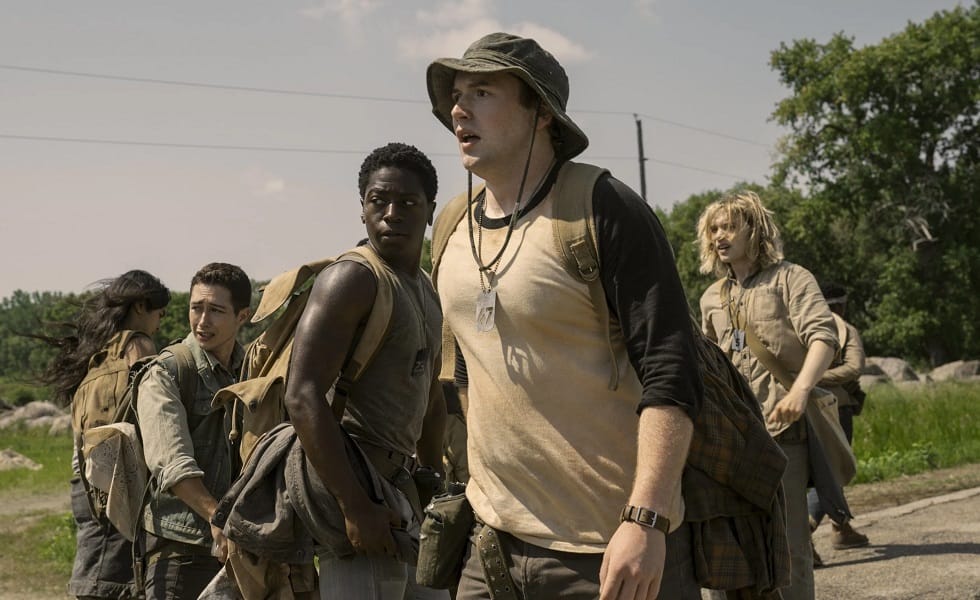Stephen King’s angriest novel comes to the screen with its period trapping intact and its bleak themes as relevant as ever.
First published in 1979 by Stephen King under his occasional nom de plume, Richard Bachman, the novel The Long Walk was written in 1967 when King was studying at the University of Maine and the Vietnam War was at its height. Now that we’re finally getting a screen adaptation, much has been made of the fact that this was King’s first completed novel. It reads like a young man’s book: fast, angry, insistent, and inflexible. It’s strident in its nihilism, its function as a Vietnam parable overshadowing all other interpretations and elements – and King offers us a lot.
It’s striking how much Francis Lawrence’s film is steeped in the iconography of the war and the period. Having finally shepherded The Long Walk to the screen after projects by the likes of George A. Romero and Frank Darabont faltered, it would not have been surprising if the director behind the bulk of fellow kids‐into-the-wood-chipper political allegory The Hunger Games had put a more contemporary spin on his adaptation.
Instead, the film’s fascist America feels like alternative history: a 70s‐ish land of muscle cars, roadside diners, and boomer bait Americana ruled by a ruthless military junta. How this came about is only vaguely alluded to, but the technology assures us that although this is speculative fiction, it’s not necessarily speculating about our immediate future.
Except, of course, all sci-fi is really about the moment of its creation and while the iconography of The Long Walk screams “Vietnam!” as loud as it can, its soldiers armed with war era M-16 rifles, its walkers dressed in a mix of military surplus and longhair casual, it’s impossible to see its depiction of a nation in the grips of a cult of personality turned death cult and not hear “MAGA!”
The film isn’t directly about American fascism under Trump, of course, no more than James Gunn‘s Superman was about Israel’s campaign of genocide in Palestine. It’s just that people have a tendency to notice real world parallels when this stuff comes up in fiction.
If anything, The Long Walk makes the case that Trump is only the latest and most horrific symptom of something cancerous and festering in the American heart. Something dumb and brutish that worships naked strength – or the appearance of strength, at least. Something that venerates youth but feeds on its blood in orgiastic frenzies of organised violence. King started writing this thing a few years before the 1970 Kent State Massacre, and the bitter irony is that the film is coming out at a time when we’re all wondering what our Kent State moment will be. But it’s hard not to think of Kent State when watching this thing either – a lot of kids who look like students get shot by soldiers who look like kids.
That’s the penalty for faltering in the titular Long Walk: drop below the minimum speed (a generous three miles per hour compared to the book’s four) and some fresh-faced youth in army fatigues will blow your brains out. That is the kindest fate waiting for all but one of the 50 young men marching south from the Maine/Canada border. Many will die much more gruesomely as the death march takes its toll on body and mind. The last man standing wins anything he wants for the rest of his life, but it hardly seems worth it.
But 50 guys a year find a reason, because people will always find reasons to sacrifice themselves. Cooper Hoffman’s Ray Garrety wants to reckon with the legacy of his activist father, executed in front of his eyes. David Jonsson’s enigmatic Peter DeVries keeps his reasons to himself, chatting amiably with his fellow walkers even though it’s clear to all and sundry the only way to survive is if everyone else dies.
Other walkers have their own motives, but they all seem meaningless once the carbines start cracking. There’s a relentless, implacable quality to The Long Walk. Lawrence and his regular cinematographer, Jo Willems, shoot things in subdued naturalistic style that only increases the tension as we wait for the first body to drop, the verisimilitude feeding into the suspense. As the body count rises, the violence becomes sickeningly mundane, but never without impact. The Long Walk is a bleakly quotidian horror movie – strip away the light dusting of genre trappings and its just about the horrors we inflict on others and ourselves in service to some barely understood but deeply entrenched ethos. It’s absurd in its way, but you know what they say about absurdities and atrocities.
The only cartoonish element is Mark Hamill‘s mononymous The Major, the public face of the regime, a man who has made himself into a caricature. As played by a gruff, barking Hamill, he’s one part tin pot dictator, one part red state demagogue – Orwell’s Big Brother for people who don’t read past the headlines. He’s completely lacking in depth, but that’s the point – fascism has a flattening effect that turns its practitioners into parodies of themselves. He’s a comic figure, but no less terrifying for that.
The film’s other characters, Garrety and DeVries aside, are archetypal – there’s the funny guy, the cynical guy, the jerk, and so on. They’re elevated from cliché by strong performances that only make their inevitable deaths more harrowing – every single one hits hard.
Which is to say it’s not an easy watch, but it was never going to be. It is, however, an excellent film if you can stomach it – but I wouldn’t blame you if you couldn’t. The Long Walk is a grim slog, to be sure, but that is the point of the exercise.
The Long Walk is in cinemas now.










